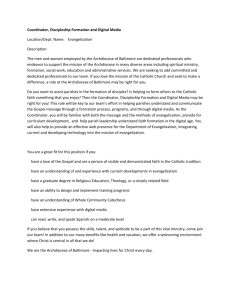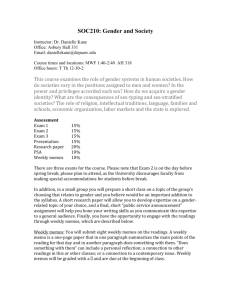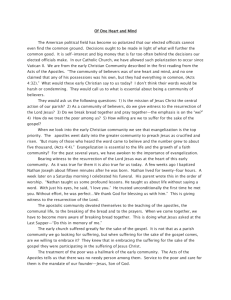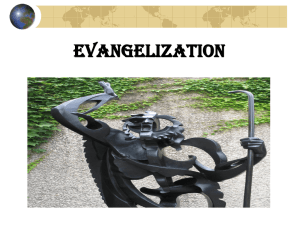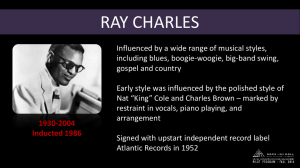doc - OFM
advertisement
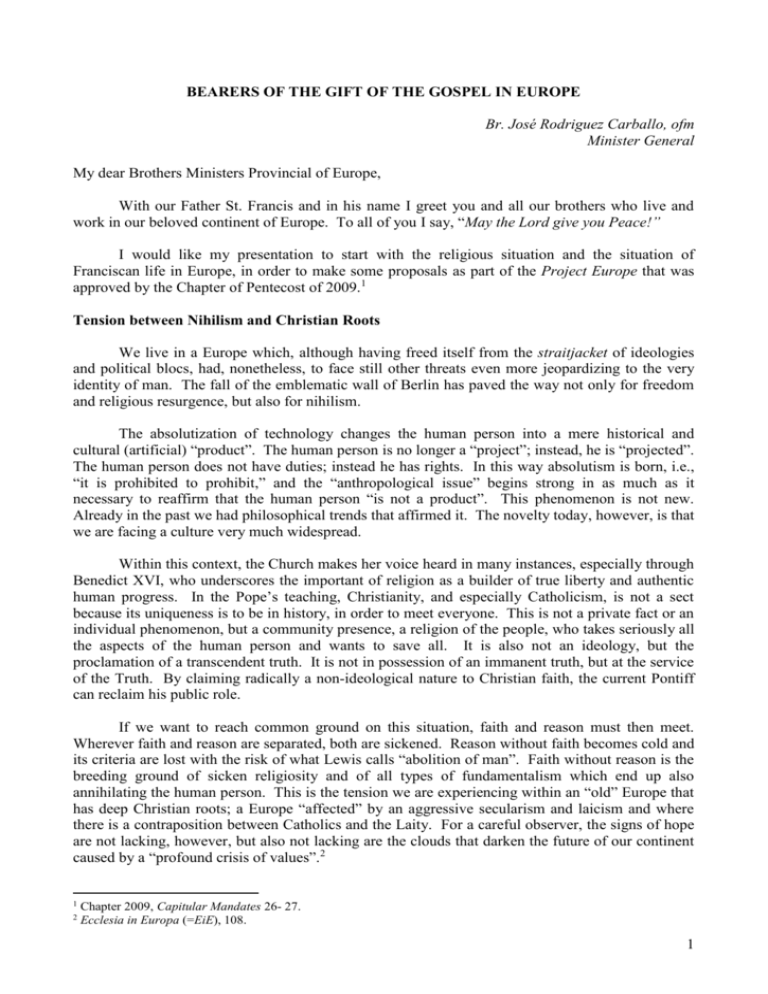
BEARERS OF THE GIFT OF THE GOSPEL IN EUROPE Br. José Rodriguez Carballo, ofm Minister General My dear Brothers Ministers Provincial of Europe, With our Father St. Francis and in his name I greet you and all our brothers who live and work in our beloved continent of Europe. To all of you I say, “May the Lord give you Peace!” I would like my presentation to start with the religious situation and the situation of Franciscan life in Europe, in order to make some proposals as part of the Project Europe that was approved by the Chapter of Pentecost of 2009.1 Tension between Nihilism and Christian Roots We live in a Europe which, although having freed itself from the straitjacket of ideologies and political blocs, had, nonetheless, to face still other threats even more jeopardizing to the very identity of man. The fall of the emblematic wall of Berlin has paved the way not only for freedom and religious resurgence, but also for nihilism. The absolutization of technology changes the human person into a mere historical and cultural (artificial) “product”. The human person is no longer a “project”; instead, he is “projected”. The human person does not have duties; instead he has rights. In this way absolutism is born, i.e., “it is prohibited to prohibit,” and the “anthropological issue” begins strong in as much as it necessary to reaffirm that the human person “is not a product”. This phenomenon is not new. Already in the past we had philosophical trends that affirmed it. The novelty today, however, is that we are facing a culture very much widespread. Within this context, the Church makes her voice heard in many instances, especially through Benedict XVI, who underscores the important of religion as a builder of true liberty and authentic human progress. In the Pope’s teaching, Christianity, and especially Catholicism, is not a sect because its uniqueness is to be in history, in order to meet everyone. This is not a private fact or an individual phenomenon, but a community presence, a religion of the people, who takes seriously all the aspects of the human person and wants to save all. It is also not an ideology, but the proclamation of a transcendent truth. It is not in possession of an immanent truth, but at the service of the Truth. By claiming radically a non-ideological nature to Christian faith, the current Pontiff can reclaim his public role. If we want to reach common ground on this situation, faith and reason must then meet. Wherever faith and reason are separated, both are sickened. Reason without faith becomes cold and its criteria are lost with the risk of what Lewis calls “abolition of man”. Faith without reason is the breeding ground of sicken religiosity and of all types of fundamentalism which end up also annihilating the human person. This is the tension we are experiencing within an “old” Europe that has deep Christian roots; a Europe “affected” by an aggressive secularism and laicism and where there is a contraposition between Catholics and the Laity. For a careful observer, the signs of hope are not lacking, however, but also not lacking are the clouds that darken the future of our continent caused by a “profound crisis of values”.2 1 2 Chapter 2009, Capitular Mandates 26- 27. Ecclesia in Europa (=EiE), 108. 1 Europe is calling us This situation makes Europe today a mission-territory and, in many cases, a “mission ad gentes”.3 Hence, for the Church one thing is clear: Europe needs to rediscover its soul. Europe needs to be evangelized and this evangelization, “in various parts of Europe”, entails “a first proclamation of the Gospel”4 and “a new proclamation everywhere, even to those who are already baptized.”5 This task is “everyone’s commitment and responsibility.”6 All the 8000 Friars Minor who live and work in Europe cannot be in the margins or an onlooker. Europe is calling us and awaits us to be protagonists/ferment in the beautiful task of evangelization of the culture and of inculturation of the Gospel in our old continent.7 Europe is calling us and awaits us to respond by proclaiming the Gospel of hope and reconciliation. Europe is calling us and awaits us to come up with an alternative project for society. We do not start from zero in this service of evangelization. In the society of his time, Francis proposed an alternative project of life to the one already in place. In a religious society that was far from living Gospel values, Francis lived and proposed an alternative project of life and mission; he was a witness of a God who is near, who is love, a God of mercy, forgiveness, and reconciliation. In a society that was deeply divided, Francis lived and proposed a project of life in fraternity, where all felt equal and as brothers. In a violent society, he lived and proposed a project of peace and reconciliation; in a society wounded by inequalities, he lived and proposed a project of life in minority where all felt as “servants” of all, including the “enemies” of the time, i.e., “the Saracens and other infidels”. Almost 800 yrs have passed since the penitent of Assisi, Francis of Benardone, responded with Gospel creativity and fantasy to what we call today the signs of the times and places. The love that set out the disciples of Jesus on a journey, leading them to proclaim the Gospel to the “whole world” and “all creatures”, is also urging us to proclaim to all that “there is no other Almighty than God” (CtaO 9). Likewise, the love that urged Francis through the roads of Europe is also calling us to be rid of fears that are motivated mostly by both the dwindling numbers of and ageing Friars; to be rid also of cowardice motivated mostly by our lack of faith; to be rid of our reduced cloisters, such as provincialism, personal comfort, embourgeoisement, etc. and cry out that “love is not loved”. Furthermore, “by word and deed” we are to bear witness to God as “the only God, the Good, the All Good, the Supreme Good, Beauty, Security, our Joy, hope, happiness, and our wealth” (AlD 1ss). Project Europe In order to respond to the call of Europe, the Order approved the so called, Project Europe, in the last Chapter of Pentecost; it was born with a twofold vocation: 1) “to give life to new forms of evangelization”8, so as to share the concerns of the Church for the spreading of the Gospel in the 3 EiE 46. EiE, 46. 5 EiE, 47. 6 EiE 33. 7 EiE 58-65. 8 General Chapter, Capitular Mandates, 26. 4 2 western world, especially in Europe,9 and at the same time 2) to revitalize and re-launch the Franciscan Charism in this continent with deep Christian and Franciscan roots – as stated by the final document of the General Chapter 2009, Bearers of the Gift of the Gospel. Project Europe also foresees to reinforce Franciscan presence in the Greek-Catholic Church in Ukraine. We still have a lot of work ahead of us in terms of drawing up and concretizing a project, determining goals and methodologies, setting times and evaluations, and identifying tasks and responsibility. Although the General Definitory and the Union of Friars Minor of Europe (UFME) need to do all this work in the Provinces and European Conferences; nevertheless, I don’t hesitate to affirm that it is about doing a providential project to ensure in Europe’s future a meaningful and Gospel Franciscan presence. We hope, in this way, that it will pave the way for a renewal of the current model of consecrated life that is less concerned with works, but more evangelically focused on the essentials, more prophetic, and more open to the needs of the men and women of our continent. On the other hand, it is clear to me that Project Europe cannot be reduced to a mere restructuring of works and existing presences nor just to a mere welcoming of brothers of other continents. Without discarding the fact that some brothers, led by the Spirit, do come to Europe as a mission territory “ad gentes”, Project Europe refers more to the endogenous revitalization of the brothers of Europe. Additionally, this project must underscore the role which the lay people are called to carry out in handing down Franciscan charism and values. In fact, shared mission with the laity is very much in demand, now more than ever and springs forth from a correct understanding of Church. Shared mission is also “an act of authentic restitution of the Gospel [as center focus].”10 Some Requirements of Project Europe Refounding our life to refound our evangelizing mission The first objective of Project Europe according to Capitular decision is that “of giving life to new forms of evangelization”, so as to make us Bearers of the Gift of the Gospel in the secularized society of Europe. Yet, given that to evangelize means to bear witness and that mission is inseparable to life, the new forms of evangelization and mission should, by necessity, start from refounding of life, so that, if possible, like Francis, we may let ourselves be changed and transformed by the Gospel. Just one life that is “touched by the dynamism of the Gospel” 11 can become an “overflowing passion for the Kingdom.”12 To this effect the Capitular Document rightly states, “We now affirm the conviction that between the priorities and evangelizing mission there must be a circular dynamic of feedback, within which our projects are placed. Within this broad perspective evangelization appears as the horizon of the whole journey of conversion of the Lesser Brother, and thus of ongoing formation. The evangelizing mission is not simply the “external” dimension of our life. In fact, consecrated life itself, under the action of the Holy Spirit who is at the origin of every vocation and charism, becomes mission, as did the life of Jesus. 13 “New wine in old wineskins” (Mt 9, 17). During this difficult moment Europe is going through, yet a moment full of hope, it is urgent for Franciscans to do an on-going discernment and constant evaluation of their lives, so that it can eventually lead to a real refounding.14 9 Cf. EiE, 61. Bearers of the Gift of the Gospel (=BGG), 25. 11 BGG, 5. 12 BGG, 28. 13 BGG, 28; VC, 72. 14 The Lord Speaks with us on the Road (=LSR), 35. 10 3 The last documents of the Order, especially the final document of the General Chapter of 2009, offer us some important and indispensable elements for refounding our life. Among these elements, the following are indicated: - Placing God at the center as the main integrator of our existence.15 It entails an authentic experience of God, who is the only One able to put us in motion16 and allow us with Gospel boldness to “try out new paths of presence and witness”;17 it entails also an experience of faith that is an “absolute source of our witness to the world.”18 In short, it is about making holiness in fraternity the commitment of each Franciscan of Europe.19 - The creation of prophetic fraternities rooted in the Gospel, 20 human fraternities that are recreated for “communion, intercommunication, and the quality and truth in relationship of brothers among themselves;”21 “signal fraternities which know how to read the signs of the times and enflesh the Gospel in a concrete and comprehensible way for the culture of our times”.22 - Reassess both initial and on-going formation in light of evangelization and mission in Europe.23 To this effect, it is urgent and necessary to invest in a European formation that strategically favors the growth of a European conscience and responsibility for European evangelization by educating our youth to have a strong and evangelized identity. - To assess the same evangelizing mission. This ought to be – as the General Chapter of 2009 affirms - “sustained by a strong experience of God” done “in fraternity and with the witness of fraternal life.” In fact, “No project of evangelization is the initiative or personal property of anyone; it is always the fraternity that evangelizes;24 it ought to distinguish itself as having an “inter gentes character, of itinerancy, of presences in unknown areas that are difficult, risky and close to the poor”. Furthermore, we must make the fate of the people our own, so that the Gospel may be “today more than ever a source of hope for them”;25 without turning our backs on the future of the world;26 allowing us to be seduced by the “forgotten and inhuman cloisters”;27 choosing with greater decisiveness the liminality of religious life, and experience marginality as the essence of our Franciscan identity;28 opting to cross frontiers;29 and “be open to the active participation of the laity and the Franciscan family”.30 The work ahead of us is not easy, but urgent. While all the brothers must pitch in, the Ministers Provincial are the ones who are to challenge and accompany the most in these processes 15 Cf. BGG, 12. Cf. BGG, 11. 17 LSR, 33. 18 LSR, 18. 19 Cf. LgP, 42-45. 20 Cf. BGG, 6. 21 BGG 27. 22 BGG, 8. 23 Cf. General Chapter 2009, Capitular Mandates, 17. 24 BGG ,27. 25 BGG, 4. 26 BGG, 29. 27 Cf. LgP, 37. 28 Cf. BGG, 23. 29 Cf. BGG 22-24. 30 Cf. General Chapter 2009, Capitular Mandates, 13. 16 4 of deep renewal and refounding of the life of the brothers. They are to remember that this task is, before and above all, an option of life. Because of this, it becomes more urgent to deepen our identity – as the last Chapter of Pentecost asked of us.31 Without reinforcing our identity, we will never be significant. It is not enough to think of restructuring! If we want it to be an occasion to become significant anew, a simpler and more vulnerable, more prophetic, and certainly more in tuned with minority,32 then we need to think in terms of refounding life in all its dimensions. In my view, this is the most urgent task that awaits the Provinces of Europe. Before thinking in terms of organizational aspects, the brothers of Europe must be concerned first to revitalize Franciscan presences in a Gospel-like manner. Then, from here new specific projects can emerge that guarantee Franciscan identity and a new vocational culture. In Light of these presuppositions, we can also think of brothers as coming to Europe just as in the days of yore when the Europeans went to other countries. However, keep in the forefront of your minds that it is not simply about a numerical reinforcement, in order to save what is in existence; rather, it is about drawing up and managing new projects which respond better to the situation of the Europe of these times. That is why I consider appropriate what the final document of the Chapter 2009 said when it states that “before becoming obsessed with realignment of our structures we must begin to read attentively the signs of times and places and allow ourselves to be questioned by them.”33 We need to consider, in addition, that in order to feel ourselves called to work in Europe, inculturation is a priority, and this entails getting to know this country’s conditions, problems, mentalities, and languages. Restructuring presences In the current situation, restructuring of presences and activities are being imposed on Europe. This is without a doubt a “painful” process. However, if we want restructuring to “make us anew significant in a simpler and more vulnerable way, but more prophetic and certainly more in tune with minority”, then we are called to discover it as “a moment of paschal grace.”34 Restructuring cannot be done just by keeping foremost in our minds the structural and pastoral demands of the Entities; we must also follow the indications given in the priorities of the Order and our forma vitae. On the other hand, when talking about restructuring, it is not simply in terms of shutting down. Rather, restructuring must be done with a serious discernment of what is valid or not, keeping in mind, at the same time, the aforesaid set of criteria. Whether our Franciscan presences are selected, restructured, shut down, or created, it must be done in accordance with this strategic orientation, namely, that only those presences or fraternities that have a clear and serious spiritual life, an attractive Franciscan life at the service of evangelization, and are in communion with the local Church actually have a future. Internationality and Interprovinciality According to Capitular Mandate, Project Europe should be characterized for its internationality and interprovinciality. This is exacting us, moreover, that we come out of our narrow geographical and cultural limits. The final document of the Chapter 2009 is asking us to de- 31 General Chapter 2009, Capitular Mandates, 2. Cf. BGG, 31. 33 BGG, 29. 34 BGG, 31. 32 5 center ourselves and be less self-referential.35 In other words, what is being asked of us is greater collaboration among the Entities of Europe. The General Chapter of 2003 spoke about “interprovincial collaboration” as the path to be taken by the Order for the future.36 Perhaps the same can be said about Europe. In other words, the future of Franciscanism in Europe depends on interprovincial collaboration. If we want to face “our missionary reality with great dynamism”, we need to start collaborating structurally. Many are the factors that demand entering into a culture of solidarity that is at the service of a common future; among them is the dwindling number of vocations which is felt all over Europe at a varying pace. The culture of solidarity must daily find its way more into the Entities, Conferences, and the universal fraternities. This is not, however, to deny or underestimate the fruits this culture of solidarity is bearing already, such as the fraternities of Palestrina, Istanbul, Brussels, the foundation of Russia/Kazakhstan, the four fraternities of Rome – just to name a few of the presences in Europe that are dependent on the Minister General. Moreover, in addition to the aforementioned factor of diminishment of vocations, collaboration is also another factor that should make us enter into a culture of solidarity. Collaboration is a result of our vocation to be signum fraternitatis within a spirituality of communion; it must involve not only the Provinces, but also the Conferences and the joint Conferences of the same continent, such as UFME. At the present time, we must confess that, while the world is become a “village”, the danger of projecting, of occupying, and being preoccupied over “one’s own places” is still quite intense. Is now the time to widen the space of our tent (cf. Is 54, 2), to cross the borders,37 to make our borders porous, to allow the flow of intercommunion and intercommunication,38 and make the passage from collaboration to interaction. New Forms of Evangelization This is not about simply preaching the Gospel and still less about being content with preaching it from the pulpits of our half-empty temples to the elderly – even though this, too, is necessary. Rather, the time has come to go out into the streets, the squares, and places that are packed with our brothers and sisters, the men and women of today. We need to recognize ourselves together with them as mendicants of meaning, sharing in their same questions and quest for meaning in history, existence, and life.39 Now is the time to let ourselves be transformed by the Gospel40 and, in this way, to bear witness to it, carrying ourselves as if we were the men of the future century – as Celano states of St. Francis. Now is the time to assume our poverty with joy and with our voice. Alhough the latter may be weak, it is, nonetheless, made strong by the Gospel as we “place ourselves in the context of the life, needs, questions and challenges of our peoples”, proclaiming to them the Good News of the Kingdom, which is “the seed of a new world of justice, of peace and of fraternity, and which today more than ever must be a source of hope for them.”41 Now is the time to open ourselves to new forms of evangelization. 35 BGG, 14. The Lord Give You Peace (=LgP), Proposals, 16. 37 Cf. BGG, 22. 38 BGG, 22. 39 Cf. LSR, 6. 40 Cf. BGG, 5. 41 BGG 4. 36 6 Any form of new evangelization must start from a life of fraternity in which primacy is given to a life of prayer, listening to the Word, and cultivating authentic and deep relationships. These new forms of evangelization should also be characterized by real choices in the field of minority, such as a simple and sober way of life which translates into concrete options, itinerancy as an integral dimension of our charism, vulnerability that entrust itself to Providence, and sharing life with the people, especially the poor and outcast. From the perspective of fraternity and minority, the first thing that is being asked of us is to be witnesses of the Gospel, to be living Gospels as St. Francis was in his time from the standpoint of the logic of the gift and gratuity.42 The only motivation that should spur us onward as Bearer of the Gift of the Gospel is the superabundance of experienced love and the experience of the Gospel as a gift called to be restored [as center focus]. For this purpose, both creative and evangelical fantasies are being asked of us. Both evangelical and creative fantasy would suggest to us the most suitable ways to restore the Gospel as center focus in Europe “as lesser brothers evangelizers with the heart turned toward the Lord.”43 A Sign of Refounding Our Life and Search for New Forms of Evangelization Foundation of “Blessed Giles of Assisi” Upon request by the fraternities of both Palestrina and Istanbul – which are dependent directly on the Minister General – during its meeting in January, the General Definitory approved the Foundation, “Blessed Giles of Assisi”, also dependent on the Minister General. Such a Foundation is an International and Intercultural Entity aimed at dialogue and mission, especially in Europe. Because the Foundation is in Europe, it can well be considered as part of Project Europe. The Foundation is not circumscribed just to a territory; its goals are as follows: - To live and promote the value of fraternal relationships as a constituent element and one that characterizes all the aspects of our life, such as prayer, work, and mission. The missionary spirit, above all, “inter gentes” in different countries, search for “new paths of presence and witness” (LSR, 33). To favor ecumenical and interreligious dialogue. The way of life in the fraternities of the Foundation will be projected according to the General Constitutions in all that refers to prayer, fraternal dialogue, manual labor, study, mission, and prophetic options of poverty and simplicity. According to articles 168 of our General Constitutions – which was voted on at the General Chapter of Pentecost 2009 and approved by the Congregation of the Consecrated life and Institutes of Apostolic life – the Minister General may incardinate or welcome “ad tempos” brothers from different Entities into the Foundation as well as receive candidates for the Order. I personally consider the erection of this Foundation as a small sign of the journey we are all called to make and as one of the realizations of the goals of Project Europe, which is, namely, to refound our life and search for new forms of evangelization. A Proposal to Keep Walking 42 43 Cf. BGG, 9. BGG, 20. 7 I propose something I already shared with the General Definitors for Europe and which I think can be realized with a little generosity and passion for evangelization for European youths. This proposal, which can very well be inscribed among the new forms of evangelization for Europe, at least partially, comes from the base, that is, from the many brothers who have experienced the journey of Santiago and who would be willing to participate in it – as they themselves have made known to me personally or in writing. Interprovincial and international presence on the journey of Santiago The journey of Santiago is at the present time one of the main springboards in Europe for the evangelization of the youth and so many other pilgrims. Every year, thousands upon thousands of youth reach the Medieval Finisterre (“the House of the Lord”) on foot, on horse, by bike or other means of locomotion. It has been 9 years since our Franciscan Province of Santiago opened a fraternity, “the Journey of Santiago”, and 3 yrs since it started accommodating pilgrims in our convent of Saint Francis of Santiago. These initiatives are good and, in my view, should be fostered. I believe that the Friars Minor of Europe should not stop reading, interpreting, and giving a response through our Franciscan spirituality, through this journey which I include among the signs of the times in Europe. They are all called, but especially in first place, the Franciscan Province of Santiago and the CONFRES. The rest of the European Entities and Conferences should not let this opportunity pass by them. The youth are coming from all over Europe. We need brothers, if possible young ones, who know how to receive them in the different languages that make up our continent. I propose, therefore, that an interprovincial and International presence be established in a suitable place of the journey; it should welcome and accompany the youth on their way to the tomb of the Apostle James, especially those who are searching or who are restless with the thought of a possible vocation. Perhaps this presence on the journey could remain open, for example, during the summer months from June to September. Establishing this presence, moreover, presupposes a network of collaboration formed by the Minister General and his Definitory, the Franciscan Province of Santiago, CONFRES, and the Provinces of UFME. Such a presence would be sustained by brothers who request to be part of it with the permission of their Ministers Provincial. The petition would be directed to the Minister General who, in close collaboration with a delegate named “ad hoc” by the Province of Santiago, will follow closely such a presence, and organize presences with the Definitors for Europe. I invite all the Entities implicated in this proposal to study it within the frame of the new forms of evangelization in Europe and participate in it with another brother. Called to call “The pastoral care of vocations is thus a vital issue for the future of the Christian faith in Europe and, in turn, for the spiritual advancement of the very peoples who inhabit the continent. It is a challenge which must be met by a Church which wishes to proclaim, celebrate and serve the Gospel of hope.”44 These words are literally applicable to our Order, especially Europe as I have already underscored in previous assemblies of UFME. Today, I want simply to stress the urgency for a real commitment from all toward a suitable pastoral care of vocations. The pastoral care of vocations should be considered one of the priority goals of these years in all of the Provinces and 44 EiE, 39 8 Conferences of Europe through a suitable care of our life in all its aspects. We are lacking evangelical and creative fantasy to propose with both respect and courage “the Gospel of vocation” to the youth. Likewise, we are lacking means and people for the evangelization of the youth. We must not give up! “The fascination of both Francis and Clare of Assisi is still great in the youth.”45 “It is not true that the youth thinks above all of consumerism and pleasures… The youth want great things, they want the good…”46 If this latter is true and I believe it is, then we should ask ourselves, “What is it that is lacking for a suitable vocational proposal for today’s youth? What is that we have left? The best structure we can invest in today is the evangelization of the youth. Our present and, especially, our future depend on them. Conclusion Brother Ministers, the General Chapter has given us this mandate of Project Europe in its twofold aspects: 1) Central and Western secularized Europe and 2) our presence in the Byzantine Ukraine. I restore it to you all with a concrete proposal in the field of new evangelization, a new presence in the journey of Santiago without forgetting the call to reinforce our presence in the Greek Catholic Church of Ukraine. While I ask UFME that – in collaboration with the General Administration – it continues through many means and goals to carry out Project Europe, I also ask generosity and openness of mind and heart to approve this proposal as well as support for the new Foundation “Blessed Giles” by sending personnel. “Not only do you have a glorious history to remember and to tell, but we also have a great history to build.” With lucidity and boldness, let us direct our gaze toward the future where the Spirit is leading us, so that he can accomplish great things through us.47 45 Juan Pablo II, Message to the General Chapter of 2003, n. 5. . (Benedict XVI, Discourse to the German Pilgrims, April 25, 2005; cf. EiE 39. 47 Cf. VC 110. 46 9
